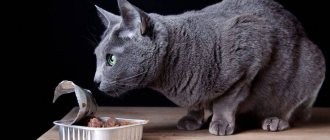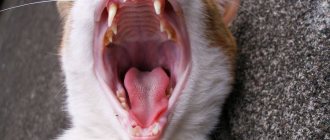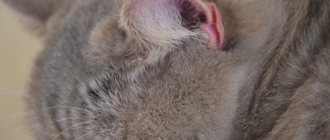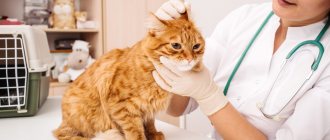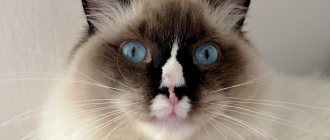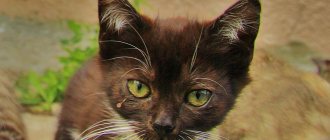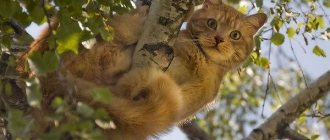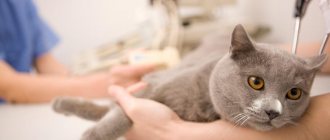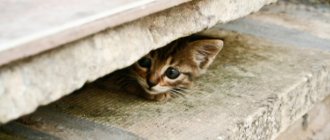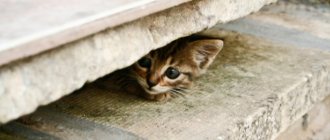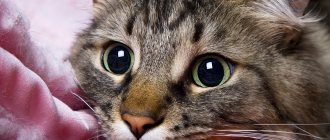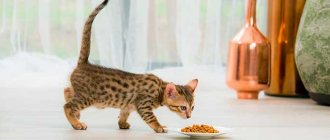Has your cat lost his appetite?
Veterinarians do not recommend panicking if an animal suddenly refuses to eat. A cat’s poor appetite can be caused by the animal’s own decision to arrange a so-called fasting day.
This often happens due to the following factors:
- the day before the pet overate and is simply digesting yesterday’s food;
- the cat protests against monotonous feeding;
- resentment towards the owner for various reasons;
- voluntary fasting , instinctively necessary for the cat family in order to cleanse the stomach and intestines.
Loss of appetite in a cat can be observed once a quarter; veterinarians consider this phenomenon harmless in the absence of signs of any diseases.
Om-Nom-nom!..
Causes and diagnosis
Having noticed that the cat has no appetite, every animal owner thinks about the question of what to do? It is important to understand that poor appetite does not mean its complete loss, which often indicates the presence of pathological processes in the animal’s body. Partial refusal of food can be caused by the following reasons:
- New and unusual food for an animal can cause it to be reluctant to eat. Cats, just like people, are distinguished by their specific taste preferences, which they cannot change too sharply. Introducing a new food too quickly, even if it is of high quality, can cause your pet to completely refuse to eat. This is most often observed when switching a cat from ready-made dry food to natural food and vice versa.
- Climatic conditions. Representatives of the cat family, like people, react to temperature changes. Often, a cat’s refusal to eat occurs at high temperatures, especially when the thermometer exceeds 30 degrees. You shouldn’t worry about this, much less try to force feed the animal. The owner’s main task during this period is to provide him with constant free access to clean water.
- Stress. Cats, like all mammals, are susceptible to stressful situations, which are accompanied by fears, worries, sadness and, as a result, refusal to eat. The main task of the owner in such a situation is to try to find out the reason for the pet’s apathetic state; perhaps it is associated with the loss of someone very dear, with the arrival of a new family member, or with a move. In advanced situations, you cannot do without consulting a veterinarian and taking sedatives.
- Surges at the hormonal level. Food refusal in females is often observed during estrus and pregnancy. Poor appetite can also occur during puberty. During the “cat wedding” period, the animal may not touch food for about a week. There is no need to worry about this, since your appetite will return immediately after this period ends.
- Dirty dishes. Representatives of the cat family are distinguished by their cleanliness. They may ignore food if their owner offers it in dirty bowls.
Cat with a kitten
These causes of partial or complete loss of appetite in a cat are not dangerous, provided that the animal feels normal, does not look sick and is in a good mood.
If a kitten has no appetite, the first thing the pet owner should do is contact a veterinarian. A possible reason for this could be infectious diseases that quickly affect a young, fragile body, which can be dangerous for the baby’s life.
Reasons why a cat refuses to eat
If your cat completely refuses to eat and only drinks water, you should seek help from a veterinarian. Complete refusal to eat is often caused by the following reasons:
- Viral or bacterial infection. This is especially dangerous for small animals, so if the kitten refuses to eat, the owner should be wary and contact a veterinarian. Any pet can catch the infection, even if it does not leave the house. In addition to lack of appetite, accompanying symptoms of bacterial or viral infection include diarrhea, often with mucus or blood, vomiting and lethargy. The pathogen can be identified by taking samples.
- Diseases of internal organs. This includes a wide list of diseases due to which a cat may lack appetite: malignant tumors, diabetes, kidney and liver lesions, ailments of the genitourinary system and stomach, diseases of the musculoskeletal system.
- Anorexia. This disease can occur due to loss of smell or touch. As a result, the animal rapidly loses weight, lethargy and apathy appear against the backdrop of a complete lack of interest in food. A characteristic sign of anorexia is excessive salivation. The main causes of this disease are nasal congestion due to treatment with antibiotics or chemicals and poisoning.
- Accumulation of hairballs in the stomach. This is relevant when an animal licks itself too often, and especially if the pet owner does not brush it during the period of active molting. A veterinarian will help you cope with the problem by prescribing special medications that prevent the formation of hairballs.
When a domestic cat loses weight
A pet that has lost weight is alarming, especially if there seems to be no reason for the cat to lose weight. However, the fact is clear - your cat has lost a lot of weight.
.
Why is a cat losing weight
?
Severe weight loss indicates a serious malfunction in the body. The cat has lost weight,
and
the reasons for
this phenomenon lie in some kind of ailment to which the animal’s body has been exposed.
A thin cat as a symptom of a disease
Such diseases include:
- a cat loses weight
when there is a hormonal imbalance (for example, during a period of estrus); - the cat is very thin
after a difficult pregnancy and childbirth, after which the animal’s body has not recovered; - gastrointestinal problems (inflammation of the mucous membrane, ulcers, constipation, diarrhea, gastritis, etc.);
- diseases of internal organs (liver pathologies, renal failure, urolithiasis, etc.);
- diseases of the teeth and gums, in which the cat is unable to eat normally;
- helminthiasis and other parasitic infections are the culprits that the cat has lost weight
; - neoplasms (polyps, oncology).
The cat has lost weight and is not eating well -
This could be due to various types of stress:
- moving to a new place of residence;
- new pet in the house;
- replacing habitual habitats and resting places with new ones (new bedding, scratching post, etc.);
- tense situation in the house.
The cat cares about its health and often arranges fasting days for itself, but this does not explain why the cat is thin.
But if you don’t keep her dishes clean, she may refuse to eat, partially or completely.
A sick cat has dry, weak fur, dandruff and bald patches. More often than not, it is this factor that makes it known that an animal is ill, because a cat’s weight loss cannot be determined visually by eye. A thin cat
gets cold, spends more time sleeping, and is reluctant to make contact with its owner and other animals.
How to stimulate appetite?
If the reasons why the cat has stopped eating are not related to diseases and viral infections, the owner should start stimulating the animal’s appetite.
If the cat refuses a new type of food, it is advisable to return to the old food option. If this is not possible, you will have to wait until the animal is very hungry and will have to eat the food offered.
An excellent option for stimulating appetite is to take cat vitamins, which contain mint, seaweed, yeast and other useful ingredients. This composition improves metabolism, strengthens the immune system and increases the cat’s appetite.
Sphinx
Causes of loss of appetite
Cats are quite sensitive animals to changes in weather. Sometimes gloomy weather and strong gusts of wind lead to a deterioration in the animal’s mood and loss of appetite. Usually this mood does not last more than a day and goes away when the sun appears.
A cat may refuse food after stress. A change of place of residence, or the departure of beloved owners on vacation, can deprive the cat of the desire to eat. In this case, appetite is also restored without the intervention of a veterinarian. But if depression lasts longer, or additional signs of ill health appear, you should definitely take your cat to the doctor.
An animal may refuse to eat during periods of illness with viral and bacterial infections accompanied by a runny nose. At the same time, she partially loses her sense of smell, and food does not seem attractive to her.
In the postoperative period, when treated with certain medications, during chemotherapy, the animal’s appetite decreases. In this case, he will recover on his own with proper care of the cat.
If poisoned by stale food or poisons, the cat refuses to eat, drinks a lot, may have increased salivation, blood in the stool, weakness, vomiting, diarrhea and other signs of intoxication.
Refusal to eat is possible in case of internal injuries and fractures, which are accompanied by internal bleeding, pain, nausea and sometimes vomiting. The animal is lethargic, makes plaintive sounds, and hides.
Almost all infectious diseases accompanied by fever lead to decreased appetite. At the same time, the cat sleeps a lot, moves little, and develops symptoms specific to a particular disease.
Traumatic brain injuries, strokes and other brain damage can cause animals to lose their sense of smell. In this case, the cat also loses interest in food.
Diseases of internal organs, primarily the digestive system, during an exacerbation period can cause a decrease in the animal’s desire to eat. This may be intestinal obstruction, a foreign body in the digestive system, inflammatory diseases of the gastrointestinal mucosa, pancreatitis and other pathologies.
Methods of treatment and prevention
Lack of appetite in a cat is not a diagnosis, but it can signal the presence of diseases dangerous to its health. Treatment in this case depends on the correct diagnosis. Often, a cat’s poor appetite is caused by reasons that have nothing to do with organ diseases and viral infections.
The main prevention of loss of appetite of an animal is proper care - timely vaccinations and examination by a veterinarian, compliance with the feeding regime.
5 month old cat, loss of appetite.
Lara, Moscow
884 views
May 7, 2020
Hello! I ask for your help! Kitten, girl, 5 months. On April 23, 2020, she had loose stools, and the next day she began to refuse food. I force-fed her by hand, using Royal Canin kitten food; she used to eat very actively. She licked her hand a little, was active, ran and played. At first I didn’t give it any importance, because I pooped every day or every other day, I was active, and I had a bad appetite - I thought I had overeaten, etc. On 04/30/2020 I went to the toilet, normally, after that I didn’t poop until 05/03/2020 and ate very poorly. I took him to the clinic. She was given Vaseline oil, which she partially vomited, but three hours after taking it she went to the toilet, first normally, then after another hour with diarrhea. The next day, 05/04/2020, they donated blood for analysis and did an ultrasound. There is no obstruction, but according to the ultrasound results there is inflammation in the stomach and intestines. According to the results of the blood test, all indicators are normal, very good - hemoglobin, leukocytes, erythrocytes, ALT, AST, some kind of bilirubin, etc. The only thing is that some eosinophils are twice as high and amount to 14, while the norm is 6-8. Doctors said it was either a food allergy or worms. But they sent me to take a test for viral peritonitis or coronavirus gastroenteritis. This is a swab from the butt to rule out or confirm, the result is not yet ready. The prescribed treatment included the antibiotic Amoxicillin 4 times every other day, 0.26 ml per weight and 1/8 tablet of Kvamotel twice a day. The antibiotic was injected on May 04 and May 06. I give Kvamotel every day. Today, in the morning of 05/07/2020, I gave 1/2 tablet of Drontal for worms. They also gave me a glucose drip, once, but then I refused because the cat felt bad, she became lethargic, cried, and hid. Pees normally twice a day. Yesterday, 05/06/2020, I pooped normal poop at 7 am and at 4 pm. Today I haven’t really gone to the toilet yet. Appetite is not restored, he eats through force and only from his hand, fraudulently. It was advised to give medicated food Gastro Royal Canin or i/d Health. Hills we finished 2/3 of a bag of pouch and dry food, about 10 granules yesterday and 23 granules today. When I’m in the kitchen, the kitten stands and meows, as if asking for food, but at the same time does not want to eat anything, it sniffs, licks and moves away. She is active and playful, rushing, running, jumping, purring. Tell me what to do next and what this could even be??? Yes, there are vaccinations, the Nobivak vaccine.
Age:
1
Chronic diseases:
Hello! I ask for your help! Kitten, girl, 5 months.
The question is closed
